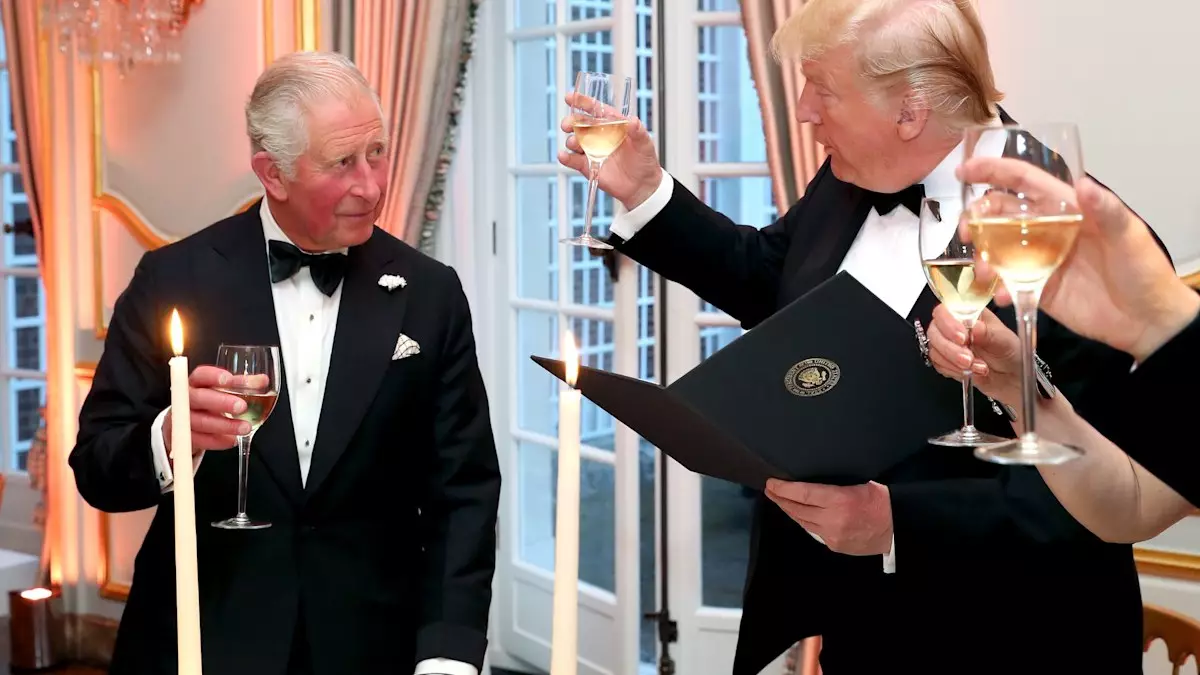The announcement of Donald Trump’s second state visit to the United Kingdom, set for September at Buckingham Palace, marks a milestone in the historically intricate relationship between the US and the UK. During a recent press briefing in the Oval Office, Trump expressed his gratitude towards King Charles, emphasizing the significance of being invited back to “the great country,” and referred to the honor as a “fest.” The choice of words is intriguing—suggesting not just a ceremonial visit but also an occasion for celebration that reflects the camaraderie between the two nations.
In contemporary political norms, second state visits for US presidents, particularly after non-consecutive terms, are rare. Traditionally, heads of state engage in state visits once during their presidencies, yet Trump’s invitation from the UK signals a possible shift in these conventions. This visit is not merely a ceremonial gathering; it encapsulates the resilience of Anglo-American relations in a continually changing global landscape.
Strengthening Diplomatic Ties
The invitation presented to Trump during a meeting with British Prime Minister Sir Keir Starmer highlights a concerted effort by Britain to foster strong diplomatic ties with the United States. Starmer articulated the significance of this visit by noting that it is unprecedented for a leader to receive such recognition after previous terms. His words resonate with the intention of deepening the bilateral relationship, underscoring the importance of state visits as opportunities for dialogue and cooperation on pressing global issues.
Trump’s statement that he has “great respect” for King Charles and the British royal family further accentuates the mutual admiration foundational to the longstanding relationship between the two countries. Importantly, the symbolic nature of this visit transcends politics—it embodies the alliance forged over decades, aiming to assert both nations’ collective influence on the world stage.
Historical Context and Personal Connections
Reflecting on Trump’s first state visit in June 2019 provides valuable context for this upcoming event. During that visit, he enjoyed a lavish welcoming ceremony in the presence of Queen Elizabeth II, along with significant figures from the royal family, including Prince Charles and the Duchess of Cornwall. The agenda was designed not only to showcase the ceremonial prestige of the monarchy but also to enhance political discussions essential for strengthening ties on international policies ranging from trade to security.
Beyond mere formalities, Trump’s fond recollections of his conversations with Prince William during their December 2024 meeting indicate an emotional resonance with the royal family. His appreciation for these connections suggests that beyond the political theater, there exists a genuine human element that fortifies diplomacy. Trump’s references to discussing personal family matters with William indicate a blending of personal and political relationships, a factor often underestimated in international relations.
The Relevance of State Visits
State visits serve as critical platforms for advancing mutual interests through diplomacy. They provide opportunities for heads of state to engage directly with each other, negotiate terms, and amplify shared values, showcasing a united front on international issues. Trump’s upcoming visit will not only spotlight the US-UK alliance but may also indicate a strategic plan for enhanced collaboration on global matters like climate change, defense, and economic stability.
The ceremonial aspects of such visits, characterized by grandeur and tradition, are also indispensable; they resonate with citizens of both nations, fueling national pride and reinforcing the narrative of partnership. This forthcoming visit to Buckingham Palace thus stands as an affirmation of both personal and national sentiment, resonating across the political spectrum.
Donald Trump’s second state visit to the UK—historically unprecedented and emotionally charged—reinforces the enduring bond between the United States and the United Kingdom. It signifies a more complex, nuanced understanding of international relations that balances ceremonial reverence with authentic human connectivity. The implications of this visit extend far beyond a mere photo op; they serve as a beacon of hope for continued cooperation on the world stage.

